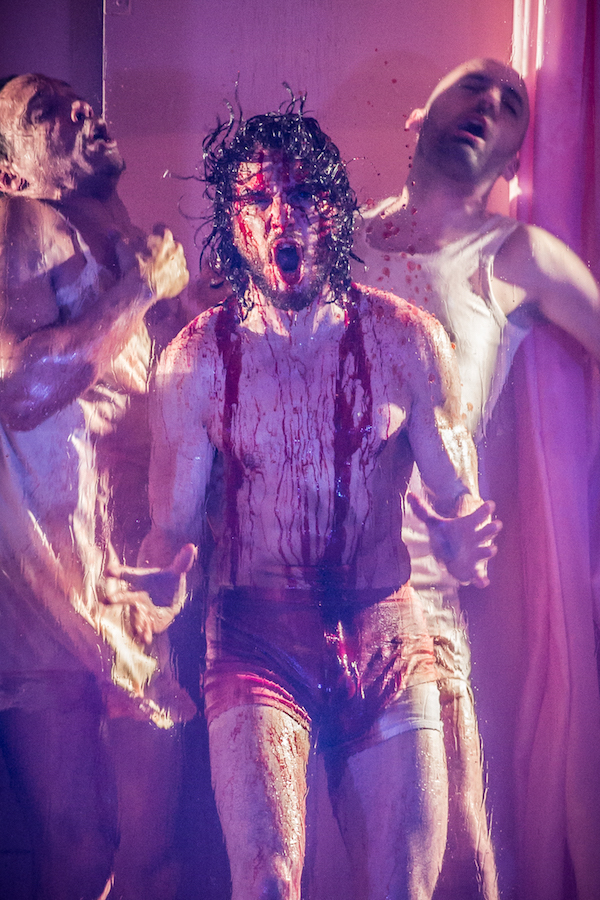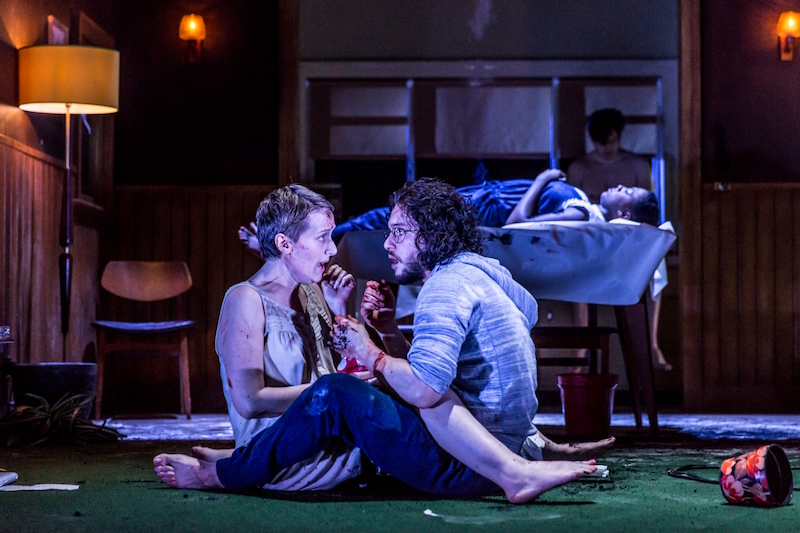Doctor Faustus, Duke of York's Theatre | reviews, news & interviews
Doctor Faustus, Duke of York's Theatre
Doctor Faustus, Duke of York's Theatre
Jamie Lloyd's contemporary take is crowded, lurid and weightless

Blood, sexual violence, power games and lashings of nudity. Not Game of Thrones, whose new season has just premiered (yes, he’s really dead. Well, for now) – and whose shadow Kit Harington is trying to escape – but Jamie Lloyd’s graphic take on Marlowe. It’s a production determined to hold your attention, and, thanks to its comic carnival of excess, largely successful in that pursuit.
This is iFaustus, with an up-to-the-minute version of the play’s contested middle section from Colin Teevan and a parade of 21st-century references. Instead of a zealous scholar, Harington’s hoodie-wearing millennial is a screen junkie, introduced with toothbrush hanging from his slack jaw as he stares at the TV, and easily seduced by the instant celebrity offered by Jenna Russell’s Mephistopheles. As a rock star magician, he headlines Vegas, spars with Pope Francis, summons Lincoln for Obama (rather than Alexander the Great for Emperor Charles V), provokes the CIA, and – in particularly clunky satire – encounters modern monsters who would rather make a deal with the devil than pay tax or give to charity: bankers, media moguls, David Cameron. (Kit Harington pictured below with Craig Stein and Tom Edden.)
 Marlowe’s play is a tricky undertaking in our secular information age. What does it mean to sell your soul, and why purchase limitless knowledge when you have the internet? The glow of an Apple laptop heralds temptation – the fruit of that forbidden tree, perhaps – but Lloyd’s contemporary parable is too cluttered to develop a coherent through-line. A film clip of David Copperfield, who explains magic was a means of escaping isolation and insecurity, suggests Faustus may be similarly unfulfilled by hollow modern life, but the production’s vague pre-pact portrait and relentless speed means his choices lack weight.
Marlowe’s play is a tricky undertaking in our secular information age. What does it mean to sell your soul, and why purchase limitless knowledge when you have the internet? The glow of an Apple laptop heralds temptation – the fruit of that forbidden tree, perhaps – but Lloyd’s contemporary parable is too cluttered to develop a coherent through-line. A film clip of David Copperfield, who explains magic was a means of escaping isolation and insecurity, suggests Faustus may be similarly unfulfilled by hollow modern life, but the production’s vague pre-pact portrait and relentless speed means his choices lack weight.
This Faustus is less concerned with loss of redemption than loss of romance with loyal assistant Wagner (Jade Anouka), realising too late that being adored by millions doesn’t compare with truly loving one. There’s a suggested religious dimension to this undercooked love story and clichéd fame-doesn’t-equal-happiness sentiment – Wagner’s first name is Grace – but nothing as incisive as Marlowe’s pioneering theological exploration. Prevailing wisdom largely goes unchallenged, with Lloyd having his cake and eating it when it comes to sexed-up celebrity culture: criticising its shallowness while capitalising on his buff lead’s star power.
Harington fares best in Teevan’s prose sections, his verse-speaking clear but too unvaried, and commits admirably – those dying to see Jon Snow’s bare buttocks dancing a merry jig will come away happy. But he more convincingly conveys the physical effects of Faustus’s 24-year excess than his spiritual and existential crisis, outclassed in the latter by Russell’s fallen angel (pictured below with Harington). Weary, matter-of-fact, trudging around in her voluminous nightie, she’s tormented by the absence of hope: “All places shall be hell that are not heaven.” Her path to eternal damnation began with the loss of a loved one – how could God’s plan contain so much pain? – and she relives that agony as she guides Faustus to his terrible fate. Forbes Masson’s Scottish Lucifer is a nasty menace in vest and pants (apparently there are no clothes in the afterlife), Craig Stein’s evil angel is a malevolent harlot, Anouka provides an appealing Wagner and traumatised Helen of Troy, and Tom Edden brilliantly imbues each of the Seven Deadly Sins with a distinct character. Soutra Gilmour’s suburban flat opening up into a soundstage echoes Faustus’s empty illusions, but the pun-tastic music choices weary, and Ben and Max Ringham’s score competes too much with the actors’ delivery, as does Polly Bennett’s thrashing abstract movement.
Forbes Masson’s Scottish Lucifer is a nasty menace in vest and pants (apparently there are no clothes in the afterlife), Craig Stein’s evil angel is a malevolent harlot, Anouka provides an appealing Wagner and traumatised Helen of Troy, and Tom Edden brilliantly imbues each of the Seven Deadly Sins with a distinct character. Soutra Gilmour’s suburban flat opening up into a soundstage echoes Faustus’s empty illusions, but the pun-tastic music choices weary, and Ben and Max Ringham’s score competes too much with the actors’ delivery, as does Polly Bennett’s thrashing abstract movement.
There are vivid moments, from chairs leaping apart as if controlled by a poltergeist to striking tableaux and surprise interval karaoke (hurry back for Russell’s operatic Meatloaf – the devil really does have all the best tunes), but the piling on of gags, gore, bodily fluids and brash cartoon becomes a series of diminishing returns. Despite the horror film shocks and liberal blood budget, it’s never really scary, nor as tragic as it should be. Commendably accessible, but verging on soulless.
rating
Share this article
The future of Arts Journalism
You can stop theartsdesk.com closing!
We urgently need financing to survive. Our fundraising drive has thus far raised £49,000 but we need to reach £100,000 or we will be forced to close. Please contribute here: https://gofund.me/c3f6033d
And if you can forward this information to anyone who might assist, we’d be grateful.

Subscribe to theartsdesk.com
Thank you for continuing to read our work on theartsdesk.com. For unlimited access to every article in its entirety, including our archive of more than 15,000 pieces, we're asking for £5 per month or £40 per year. We feel it's a very good deal, and hope you do too.
To take a subscription now simply click here.
And if you're looking for that extra gift for a friend or family member, why not treat them to a theartsdesk.com gift subscription?
more Theatre
 Othello, Theatre Royal, Haymarket review - a surprising mix of stateliness and ironic humour
David Harewood and Toby Jones at odds
Othello, Theatre Royal, Haymarket review - a surprising mix of stateliness and ironic humour
David Harewood and Toby Jones at odds
 Macbeth, RSC, Stratford review - Glaswegian gangs and ghoulies prove gripping
Sam Heughan's Macbeth cannot quite find a home in a mobster pub
Macbeth, RSC, Stratford review - Glaswegian gangs and ghoulies prove gripping
Sam Heughan's Macbeth cannot quite find a home in a mobster pub
 The Line of Beauty, Almeida Theatre review - the 80s revisited in theatrically ravishing form
Alan Hollinghurst novel is cunningly filleted, very finely acted
The Line of Beauty, Almeida Theatre review - the 80s revisited in theatrically ravishing form
Alan Hollinghurst novel is cunningly filleted, very finely acted
 Wendy & Peter Pan, Barbican Theatre review - mixed bag of panto and comic play, turned up to 11
The RSC adaptation is aimed at children, though all will thrill to its spectacle
Wendy & Peter Pan, Barbican Theatre review - mixed bag of panto and comic play, turned up to 11
The RSC adaptation is aimed at children, though all will thrill to its spectacle
 Hedda, Orange Tree Theatre review - a monument reimagined, perhaps even improved
Scandinavian masterpiece transplanted into a London reeling from the ravages of war
Hedda, Orange Tree Theatre review - a monument reimagined, perhaps even improved
Scandinavian masterpiece transplanted into a London reeling from the ravages of war
 The Assembled Parties, Hampstead review - a rarity, a well-made play delivered straight
Witty but poignant tribute to the strength of family ties as all around disintegrates
The Assembled Parties, Hampstead review - a rarity, a well-made play delivered straight
Witty but poignant tribute to the strength of family ties as all around disintegrates
 Mary Page Marlowe, Old Vic review - a starry portrait of a splintered life
Tracy Letts's Off Broadway play makes a shimmeringly powerful London debut
Mary Page Marlowe, Old Vic review - a starry portrait of a splintered life
Tracy Letts's Off Broadway play makes a shimmeringly powerful London debut
 Little Brother, Soho Theatre review - light, bright but emotionally true
This Verity Bargate Award-winning dramedy is entertaining as well as thought provoking
Little Brother, Soho Theatre review - light, bright but emotionally true
This Verity Bargate Award-winning dramedy is entertaining as well as thought provoking
 The Unbelievers, Royal Court Theatre - grimly compelling, powerfully performed
Nick Payne's new play is amongst his best
The Unbelievers, Royal Court Theatre - grimly compelling, powerfully performed
Nick Payne's new play is amongst his best
 The Maids, Donmar Warehouse review - vibrant cast lost in a spectacular-looking fever dream
Kip Williams revises Genet, with little gained in the update except eye-popping visuals
The Maids, Donmar Warehouse review - vibrant cast lost in a spectacular-looking fever dream
Kip Williams revises Genet, with little gained in the update except eye-popping visuals
 Ragdoll, Jermyn Street Theatre review - compelling and emotionally truthful
Katherine Moar returns with a Patty Hearst-inspired follow up to her debut hit 'Farm Hall'
Ragdoll, Jermyn Street Theatre review - compelling and emotionally truthful
Katherine Moar returns with a Patty Hearst-inspired follow up to her debut hit 'Farm Hall'
 Troilus and Cressida, Globe Theatre review - a 'problem play' with added problems
Raucous and carnivalesque, but also ugly and incomprehensible
Troilus and Cressida, Globe Theatre review - a 'problem play' with added problems
Raucous and carnivalesque, but also ugly and incomprehensible

Add comment